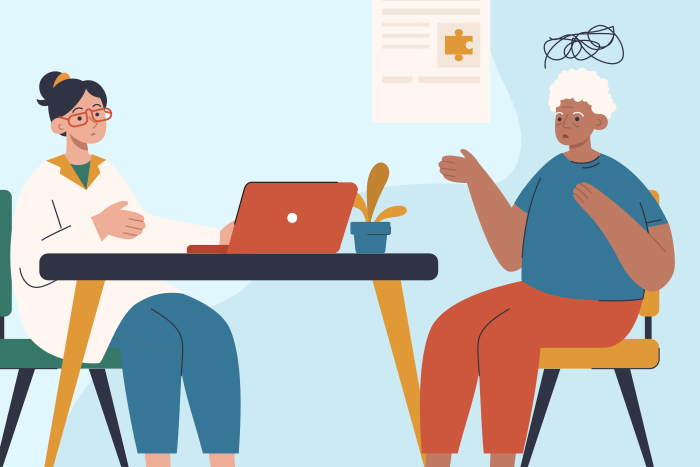Treatment for Anxiety
Feeling worried now and then is a normal part of life. But when anxiety sticks around and starts to affect your daily routine, it's important to know help is available. For older adults, treating anxiety is especially important because it can put extra strain on the heart and overall health. The good news? Anxiety is highly treatable, and many seniors find relief with the right plan.
In this article, we'll walk through simple, effective ways to treat anxiety, and why talking with your doctor is the best first step.
Why Treating Anxiety Matters
Anxiety doesn’t just live in the mind—it affects the body, too. Over time, constant worry and stress can raise your blood pressure, strain your heart, and even make it harder for you to fight off illnesses.
For older adults, anxiety can also worsen other health conditions like diabetes, COPD, or arthritis. That's why finding ways to manage anxiety isn’t just about feeling better emotionally—it’s about protecting your overall health.
Common Treatments for Anxiety
There’s no one-size-fits-all answer, but there are many proven ways to treat anxiety. Often, a combination of treatments works best.
1. Talk Therapy
One of the most effective treatments for anxiety is talking with a trained professional. This is called therapy or counseling.
Cognitive Behavioral Therapy (CBT) is a common type of talk therapy. It teaches you how to spot negative thinking patterns and replace them with more positive ones. Therapy can be done in person, over the phone, or even through video calls from your home.
Many older adults find that just having someone to talk to regularly makes a big difference.
2. Medications
Sometimes, a doctor may recommend medicine to help manage anxiety. Medicines can help balance chemicals in the brain that affect mood. These medications include:
SSRIs (Selective Serotonin Reuptake Inhibitors): These are often the first choice for treating anxiety. They help balance the brain chemicals that affect mood. Common examples: Sertraline (Zoloft), Escitalopram (Lexapro), and Paroxetine (Paxil).
SNRIs (Serotonin and Norepinephrine Reuptake Inhibitors): These work in a similar way to SSRIs and may also be used. Common example: Venlafaxine (Effexor XR).
Buspirone: This medication is often used for ongoing anxiety. It’s not addictive and usually has mild side effects.
Benzodiazepines: These fast-acting medications may be used for short-term relief. But they can be habit-forming and are not usually recommended for long-term use—especially in older adults. Common examples: Lorazepam (Ativan) and Alprazolam (Xanax).
Always talk with your doctor about the pros and cons of each medication. Never stop or start a medication without medical advice.
3. Lifestyle Changes
Small daily habits can go a long way in easing anxiety. Some easy changes include:
Moving Your Body: Gentle exercise like walking, stretching, or chair yoga helps release natural "feel good" chemicals (dopamine) in the brain.
Breathing Exercises: Deep, slow breaths can help calm your nervous system quickly.
Good Sleep: Sticking to a regular bedtime and creating a relaxing nighttime routine can improve sleep, which often improves anxiety.
Eating Well: Fresh fruits, vegetables, and whole grains help fuel both body and mind.
Even small steps each day can add up to big improvements over time.
4. Social Support
Staying connected is important. Spending time with family, joining a local senior group, or even chatting with neighbors can lift your mood and lower anxiety. Loneliness can make anxiety worse, so don’t be afraid to reach out.
5. Mindfulness and Relaxation Techniques
Relaxation isn't just about taking it easy—it’s a skill you can practice. Mindfulness meditation, prayer, or simply sitting quietly and noticing your surroundings can help you feel calmer and more in control.
Apps, free videos online, or community classes can be good resources if you're new to relaxation techniques.
When to Talk to a Doctor About Your Anxiety
If your worries feel bigger than you can handle on your own—or if anxiety is stopping you from doing things you enjoy—it’s time to talk with your doctor. They can help figure out if what you're feeling is anxiety and help you build a treatment plan that fits your life.
Some signs you should reach out include:
Trouble sleeping
Feeling constantly tense or on edge
Avoiding social activities
Heart palpitations (racing heart) without a clear reason
For people who live alone or who are experiencing severe anxiety symptoms, a medical alert device can be a helpful tool to get support quickly if needed.* You are not alone, and asking for help is a strong and important first step.
Hope Is Closer Than You Think
Anxiety can feel overwhelming, but remember—it is treatable. Many older adults find new joy and energy once they take that first step toward managing their anxiety. Whether it’s through therapy, medication, lifestyle changes, or support from loved ones, there are many paths to feeling better. You deserve to live with peace of mind and a healthy heart. Talk with your doctor today about the options that are right for you.
Sources:
National Institute of Mental Health: Anxiety Disorders
National Institute of Mental Health: Older Adults and Mental Health
National Council on Aging: Anxiety and Older Adults: A Guide to Getting the Relief You Need
*Disclaimer: Healthcare Select may earn a commission if you purchase a product or service through links to our partners. This comes at no extra cost to you.

